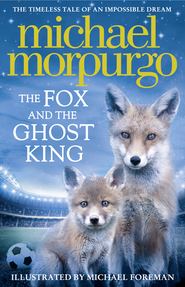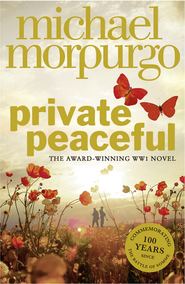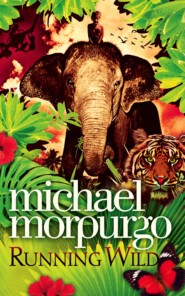По всем вопросам обращайтесь на: info@litportal.ru
(©) 2003-2025.
✖
The Classic Morpurgo Collection
Настройки чтения
Размер шрифта
Высота строк
Поля
“He always liked a good scratch just there,” Bertie said, smiling at me. “I told you I would find him, didn’t I?” he went on. “I was never sure you really believed me.”
“Well, I did,” I replied, and then I added: “After a while, anyway.” It was the truth. I suppose that may explain why I took all that happened that morning so much in my stride. It was amazing, surreal almost, but it was no surprise. A prophecy come true, like a wish come true – and this was both – can never be entirely surprising.
As we sat there outside the cafe sipping our wine, the three of us decided what should be done about The White Prince. Monsieur Merlot kept crying and saying it was all “un miracle, un miracle”; and then he would wipe the tears from his eyes again, and drink down another glass of wine. He liked his wine.
The whole plan was entirely Bertie’s idea. To be honest, I didn’t see how it could possibly be done. I should have known better. I should have known that once Bertie had set his heart on something, he would see it through.
As we walked the lion down the village street, Bertie leaning on the lion, me pushing Monsieur Merlot in the wheelchair, the crowd parted in front of us and backed away. Then they began to follow us, at a discreet distance, of course, up the road towards Bertie’s hospital. Someone must have gone on ahead to warn them, because we could now see a huddle of doctors and nurses gathered on the front steps, and there were people peering out of every window. As we came up to the hospital, an officer stepped forward, a colonel it was.
Bertie saluted. “Sir,” he began, “Monsieur Merlot here is a very old friend of mine. He will need a bed in the hospital. He’s in need of rest, sir, and a lot of good food. The same goes for the lion. So I wondered, sir, if you’d mind if we used the walled garden behind the hospital. There’s a shed in there where the lion could sleep. He’d be quite safe, and so would we. I know him. He doesn’t eat people. Monsieur Merlot here has said that if I can feed the lion and take care of him, then I can take him back to England with me.”
“The brass cheek of it!” the colonel spluttered as he came down the steps. “Who the devil do you think you are anyway?” he said. And that was when he recognised Bertie. “You’re the fellow that won the VC, aren’t you?” he said, suddenly a lot more polite. “Andrews, isn’t it?”
“Yes, sir, and I want to take the lion back to England when I go. We’ve got somewhere in mind for him to live,” and he turned to me. “Haven’t we?” he said.
“Yes,” I said.
It wasn’t at all easy persuading the colonel to agree. He began to soften only when we told him that if we didn’t look after the white lion, no one else would, and then he would have to be taken away and shot. A lion, the symbol of Britain, shot! Not at all good for morale, Bertie argued. And the colonel listened.
It wasn’t any easier persuading the powers that be in England to allow the lion to come back home when the war was over, but somehow Bertie managed it. He just wouldn’t take no for an answer. Bertie always said afterwards that it was the medal that did it, that without the prestige of the Victoria Cross behind him he’d never have got away with it, and The White Prince would never have come home.
When we docked at Dover, the band was playing and the bunting was out, and there were photographers and newspaper reporters everywhere. The White Prince walked off the ship at Bertie’s side to a hero’s welcome. “The British Lion Comes Home” roared the newspapers the next day.
So we came back here to Strawbridge, Bertie, The White Prince and me. I married Bertie in the village church. I remember, Bertie had a bit of a disagreement with the vicar because he wouldn’t allow the lion inside the church for the wedding. I was very glad he didn’t – but I never told Bertie that. Nanny Mason adored both Bertie and The White Prince, but she insisted on washing him often, because he smelt – the lion, not Bertie. Nanny Mason stayed on with the three of us – “her three children”, she called us – until she retired to the seaside in Devon.
The Butterfly Lion (#ulink_ee23d807-1974-5dcf-b8fd-fa16cabc2db9)
We never had children of our own – just The White Prince – and I can tell you, he was enough of a family for anyone. He roamed free in the park just as we had planned he would, and chased the deer and the rabbits whenever he felt like it; but he never did learn how to kill for himself. You can’t teach old lions new tricks. He lived well, on venison mostly, and slept on a sofa on the landing – I wouldn’t have him inside our bedroom, no matter how often Bertie asked. You have to draw the line somewhere.
Bertie’s leg never recovered completely. When it was bad, he often needed a stick, or me, or the lion to lean on. It pained him a lot, particularly when the weather was cold and damp, and he never slept well. On Sundays the three of us would wander the park together, and he would sit on the top of Wood Hill with his arm around his old friend’s neck and I would fly kites. As you know, I’ve always loved kites; and so, it turned out, did the lion, who pounced on several of them as they landed, savaged them and ripped them to pieces.
The lion never showed any interest in escaping, and even if he’d wanted to, the park wall was too high for an old lion to jump. Wherever Bertie went he wanted to go too. And if ever Bertie went out in the car, then he’d sit by me near the stove in the kitchen, and watch me with those great amber eyes, listening all the while for the sound of Bertie’s car coming up the gravel to the front of the house.
The old lion lived on into a ripe old age. But he became stiff in his legs and could see very little towards the end. He spent his last days stretched out asleep at Bertie’s feet, right where you’re sitting now. When he died, we buried him at the bottom of the hill out there. Bertie wanted it that way so he could always see the spot from the kitchen window. I suggested we plant a tree in case we forgot where he was. “I’ll never forget,” he said fiercely. “Never. And besides, he deserves a lot more than a tree.”
Bertie grieved on for weeks, months after the lion died. There was nothing I could do to cheer him or even console him. He would sit for hours in his room, or go off on long walks all on his own. He seemed so shut away inside himself, so distant. Try as I did, I could not reach him.
Then one day I was in the kitchen here, when I saw him hurrying down the hill, waving his stick and shouting for me.
“I’ve got it,” he cried, as he came in, “I’ve got it at last.” He showed me the end of his stick. It was white. “See that, Millie? Chalk! It’s chalk underneath, isn’t it?”
“So?” I said.
“You know the famous White Horse on the hillside at Uffington, the one they carved out of the chalk a thousand years ago? That horse never died, did it? It’s still alive, isn’t it? Well, that’s what we’re going to do, so he’ll never be forgotten. We’ll carve The White Prince out on the hillside – he’ll be there for ever, and he’ll be white for ever too.”
“It’ll take a bit of time, won’t it?” I said.
“We’ve got plenty, haven’t we?” he replied, with the same smile he had smiled at me when he was a ten-year-old boy asking me if he could come back and mend my kite for me.
It took the next twenty years to do it. Every spare hour we had, we were up there scraping away with spades and trowels; and we had buckets and wheelbarrows to carry away the turf and the earth. It was hard, back-breaking work, but it was a labour of love. We did it, Bertie and I, we did it together – paws, claws, tail, mane, until he was whole and perfect in every detail.
It was just after we’d finished that the butterflies first came. We noticed that when the sun comes out after the rain in the summer, the butterflies – Adonis Blues, they are, I looked them up – come out to drink on the chalk face. Then The White Prince becomes a butterfly lion, and breathes again like a living creature.
So now you know how Bertie’s white lion became The White Prince and how The White Prince became our butterfly lion.
And the Lion Shall Lie Down with the Lamb (#ulink_e21a3c1e-4a12-5a43-b480-97acde94ed40)
The old lady turned to me and smiled. “There,” she said. “That’s my story.”
“And what about Bertie?” I knew as I asked that I shouldn’t have. But I had to know.
“He’s dead, dear,” the old lady replied. “It’s what happens when you get old. It’s nothing to worry about. It’s lonely, though. That’s why I’ve got Jack. And Bertie, like his lion, lived on to a good age. He’s buried out there under the hill beside The White Prince.” She looked back at the hill for a moment. “And that’s where I belong too,” she said.
She tapped the table with her fingers. “Come on. Time to go. Back to school with you before they miss you and you get yourself into trouble. We wouldn’t want that, would we?” She laughed. “Do you know, that’s just what I told Bertie all those years ago when he ran away from school. You remember?” She was on her feet now. “Come on, I’ll drive you. And don’t look so worried. I’ll make sure no one sees you. It’ll be like you’ve never been gone.”
“Can I come again?” I asked.
“’Course you can,” she said. “I may not always be easy to find, but I’ll be here. I’ll just tidy away the tea things, and then we’ll go, shall we?”
It was a very old-fashioned car, black and upright and dignified, with a leathery smell and a whiny engine. She dropped me at the bottom of the school park, by the fence.
“Take care, dear,” she said. “And be sure you come again soon, won’t you? I’ll be expecting you.”
“I will,” I replied. I climbed the fence before I turned to wave; but by that time the car had gone.
To my huge relief no one had missed me. And best of all, Basher Beaumont was in the sickroom. He’d gone down with measles. I just hoped his measles would last a long time, a very long time.
All through supper I could think of nothing but Bertie Andrews and his white lion. Stew and dumplings and then semolina pudding with raspberry jam – again! It was as I was picking my way through my slimy semolina that I remembered Bertie Andrews had been at this school. Maybe, I thought, maybe he’d had to sit here and eat slimy semolina just as we did now.
I looked up at the honours boards around the dining hall, at the names of all the boys who had won scholarships over the years. I looked for Bertie Andrews. He wasn’t there. But then, I thought, why should he be? Maybe, like me, he wasn’t brilliant at his school work. Not everyone wins scholarships.
Cookie – Mr Cook, my history teacher – was sitting beside me at the end of my table. “Who were you looking for, Morpurgo?” he asked suddenly.
“Andrews, sir,” I said. “Bertie Andrews.”
“Andrews? Andrews? There’s an Albert Andrews who won the Victoria Cross in the First World War. You mean him?” Cookie scraped his bowl clean and licked the back of his spoon. “I love raspberry jam. You’ll find his name in the chapel, under the East Window, under the War memorial. But he wasn’t killed in the war, you know. He lived down at Strawbridge, that place with the lion on the gateway, just across the main road. He died, maybe ten, twelve years ago, soon after I came to teach here. The only old boy ever to win the VC. That’s why they put up a memorial plaque to him in the chapel after he died. I remember the day his wife came to unveil it – his widow, I should say. Poor dear, just herself and her dog in that great big place. She died only a few months later. Broken heart, they say. You can, you know. You can die of a broken heart. That house has been empty ever since. No family to take it on. No one wants it. Too big, you see. Shame.”
I said I wanted to be excused, to go to the toilet. I hurtled down the passage, out across the courtyard and into the chapel. The small brass plaque was exactly where Cookie had said it was, but hidden by a vase of flowers. I moved the vase to one side. The plaque read:
ALBERT ANDREWS VC
BORN 1897. DIED 1968.
AN OLD BOY OF THIS SCHOOL.
AND THE LION SHALL LIE DOWN
WITH THE LAMB.











